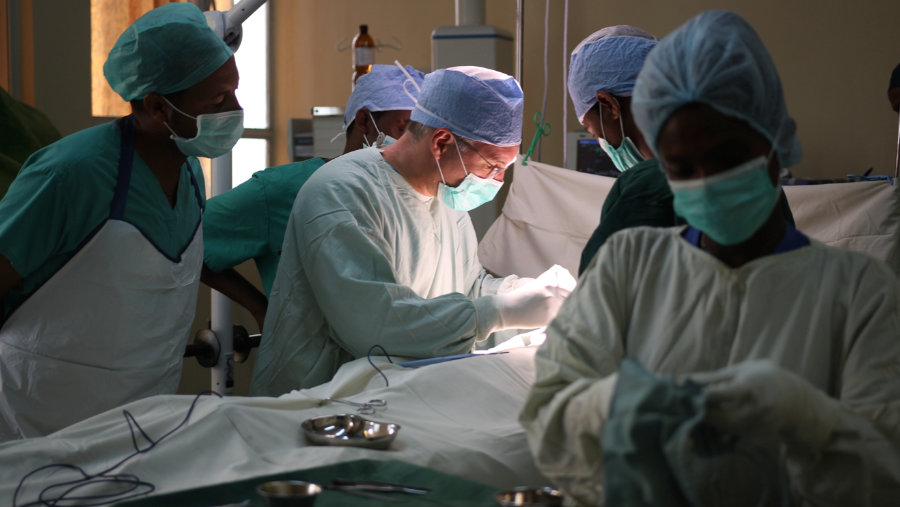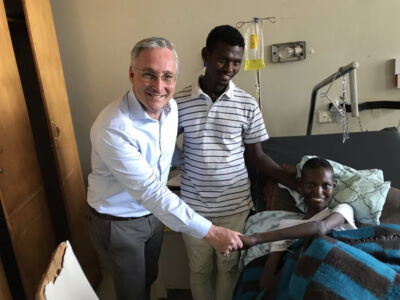Training at Ayder Hospital in the field of visceral surgery
In 2011, the Ethiopian gynecologist Dr. Asfaw Fekensa, a cooperation partner of Etiopia-Witten in Bishoftu, diagnosed a tumor of the pancreas. It turned out that an operation in Ethiopia was not possible, so the intervention had to be carried out at the Raphaels Clinic in Münster, Germany.

Dr. Ursula Wahle, Doris Batke-Bonhoff, Wojni und Dr. Asfaw Fekensa, Sister Reginfrieda und Prof. Matthias Hoffmann during the visit of Dr. Asfaw Fekensa in Münster/Germany 2017
To close this gap, a training program was launched so that major upper abdominal surgery on the pancreas or liver can also be carried out in Ethiopia. For this purpose, the surgical colleagues at Ayder Hospital in Mekelle should be trained in this specialized surgery. The basic idea was to carry out the training primarily “on-the-spot”, i.e. on-site with the available resources and employees in such a way that the colleagues there are given the security and competence to carry out these large operations independently.

Prof. Matthias Hoffmann active in the operating room of the Ayder Hospital
For this purpose, a medical team consisting of an experienced visceral surgeon (Prof. Dr. Dr. Matthias Hoffmann), an intensive care nurse (Doris Batke-Bonhoff) and gastroenterological colleagues has traveled to Mekelle every year since then. The team led by the chief physician of the surgical clinic there, Dr. Reiye Esayas, to the extent that in recent years major upper abdominal surgeries such as pancreatic resections (Whipple surgery) or extended liver resections could be carried out independently and regularly at Ayder Hospital. In addition to surgical training, the program focuses on training in the intensive care unit and promoting interdisciplinary collaboration between the various medical departments..

Patient on the 1st day after pancreatic surgery (Whipple surgery)
With the support of Etiopia Witten, Dr. Reiye enables the attendance of international congresses and internships in Münster and Witten. Together with Prof. Matthias Hoffmann, he is involved in the expansion of liver and pancreas surgery in Ethiopia and also in Southern Africa as part of the International Hepatobiliary Society (IHPBA).

Dr. Reiye Esayas and Prof. Hoffmann at the congress of the European-African Hepatobiliary Society in Mainz/Germany 2017
The aim of the further collaboration is to further train the motivated young surgeons at Ayder Hospital in major upper abdominal surgery and to promote the spread of these surgical techniques in other hospitals in Ethiopia and Southern Africa. With the support of Etiopia Witten, a surgical intensive care unit is currently being set up at Ayder Hospital.

Prof. Hoffmann with Ethiopian surgeons at Ayder Hospital in Mekelle/Ethiopia
Modern special nutrition is needed
for patients in the context of modern surgery
The chief physician of the surgical clinic of the Rafael Clinic in Münster, Prof. Dr. Matthias Hoffmann has been working annually with the organization Etiopia Witten e.V. in Mekelle since 2013, to train Ethiopian surgeons on site. These operations are now carried out independently on the liver and pancreas. The program has currently been expanded to two university hospitals in Addis Ababa.
In addition to the medical-technical problems in the care of seriously ill patients in Ethiopia, malnutrition has proven to be a major problem. Many patients come to the hospital in an extremely reduced and malnourished state and have great problems recovering after a major abdominal operation or the severe burns that unfortunately often occur in children. Essential drugs after pancreatic surgery or high-calorie nutritional supplements are not available in the country and would have to be imported from abroad at high cost.
With the doctor and nutrition specialist Dr. Judith Rendon there has been an extremely motivated and committed colleague in Mekelle for many years. She has set itself the goal in collaboration with German Etiopia-Witten e.V. to develop nutritional concepts using the locally available resources. These include the establishment of a nutrition laboratory with the appropriate equipment and personnel, the establishment of nutritional focal points in the intensive care and incineration ward, as well as projects on the use of local fruits and vegetables to remedy the enzyme and nutritional deficits with locally available means.
Unfortunately, in the current political and medical emergency, the Ethiopian Federal state funds for this area have been massively reduced, so that Dr. Rendon is extremely dependent on foreign support. Prof. Dr. Hoffmann has been committed to supporting funding this through donations for years.




